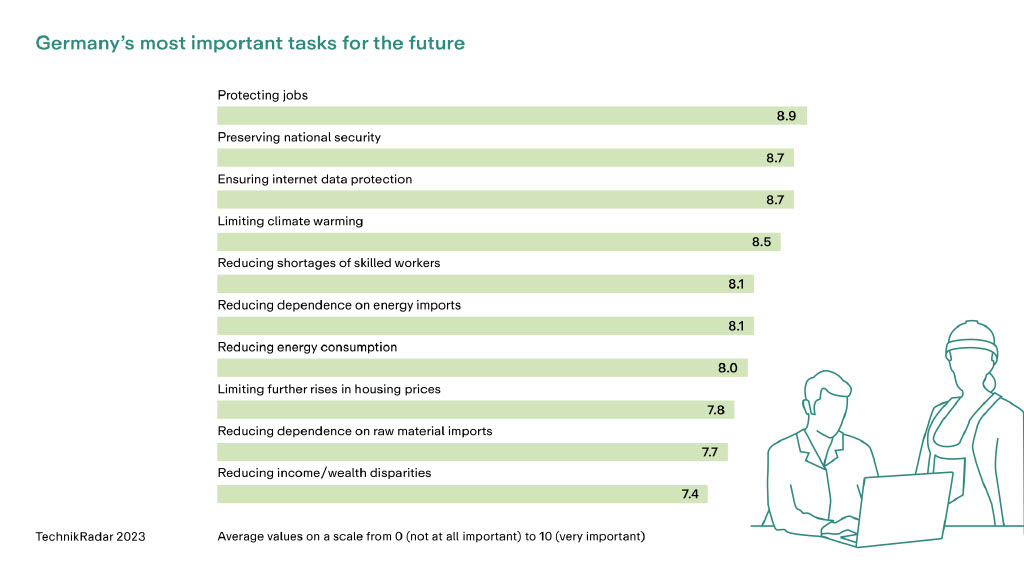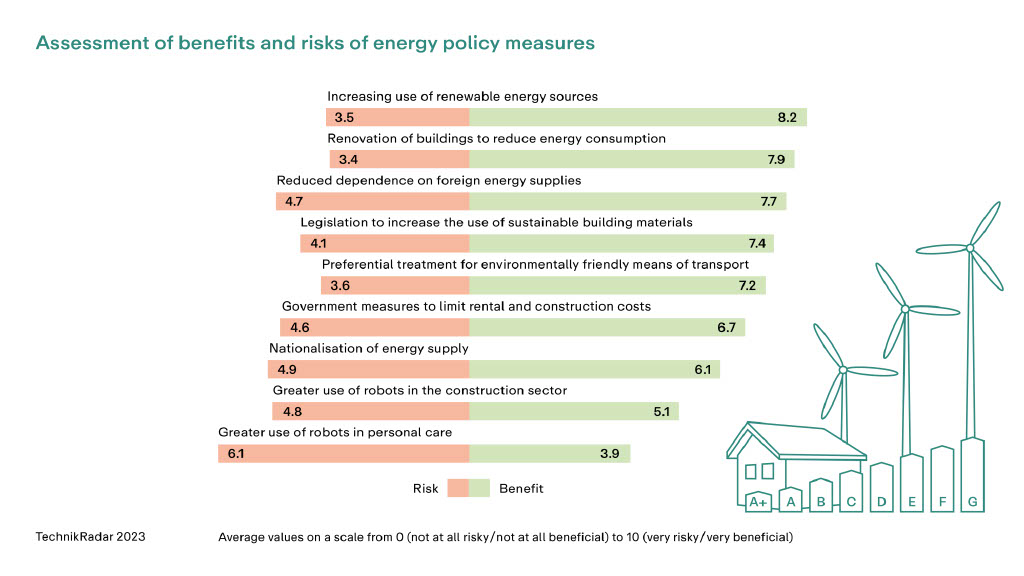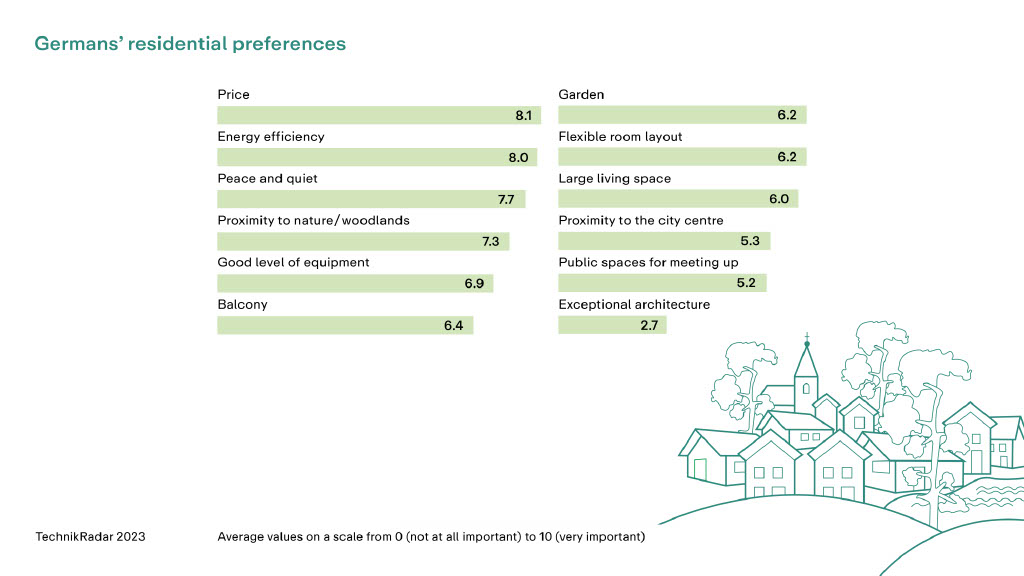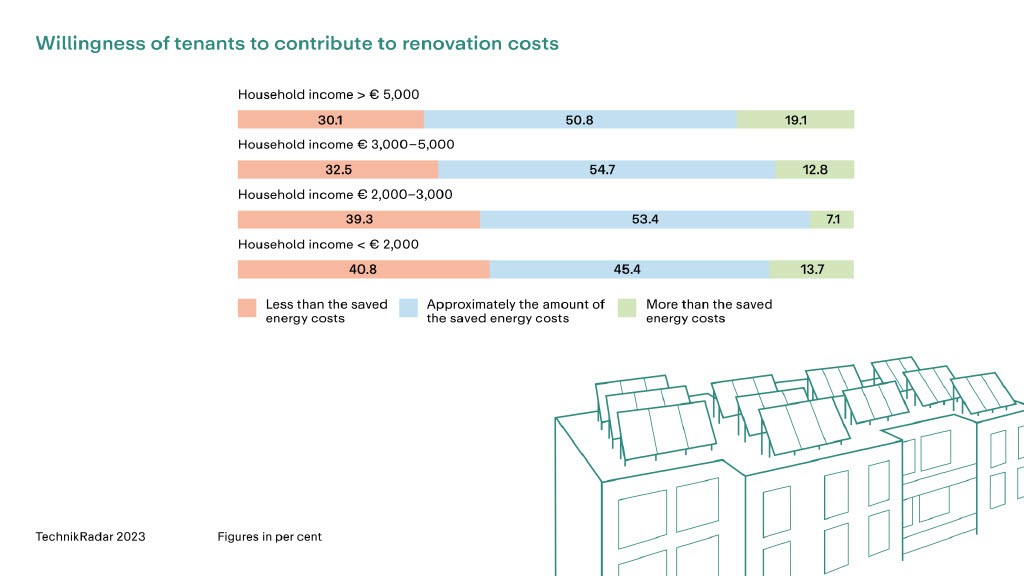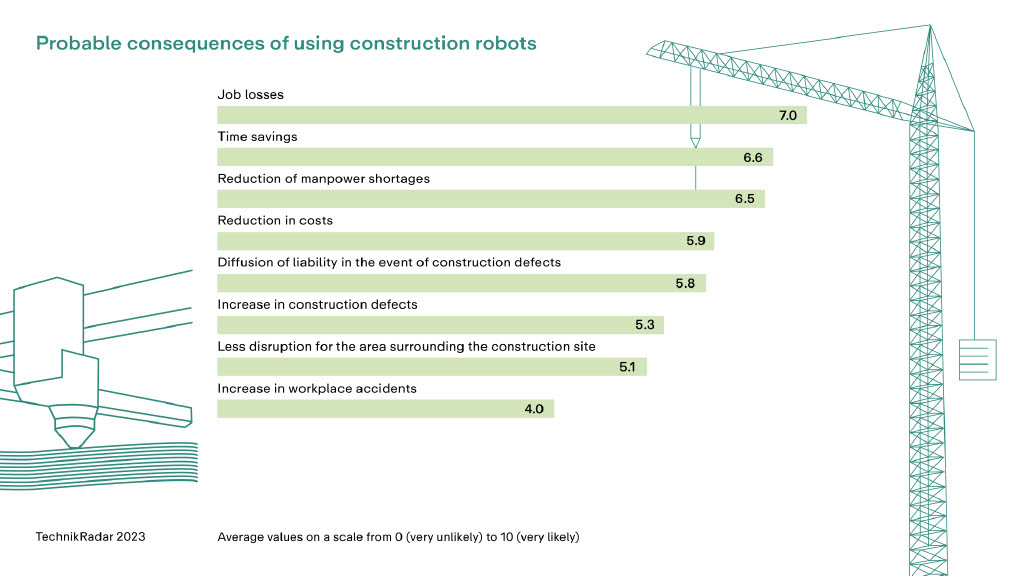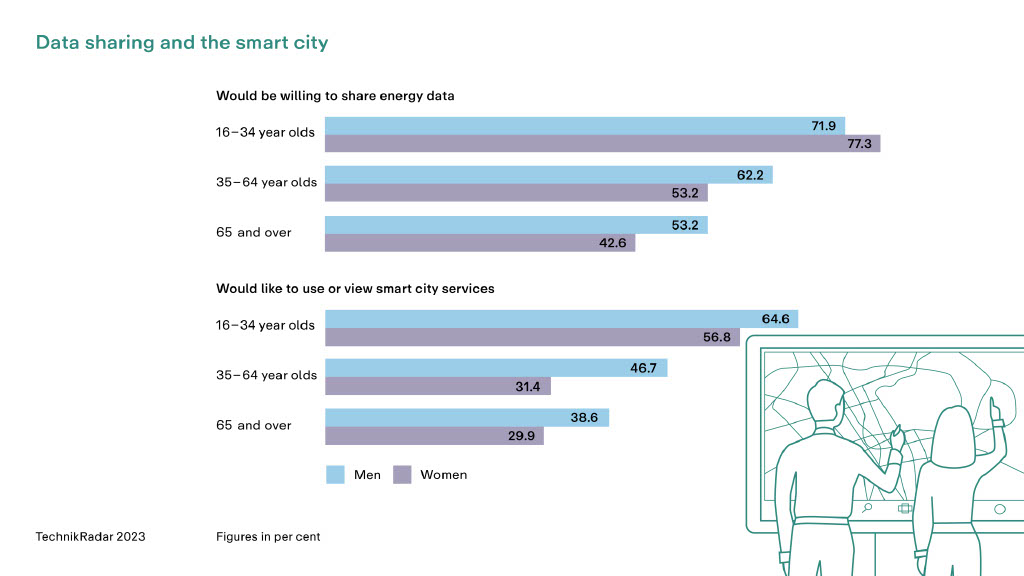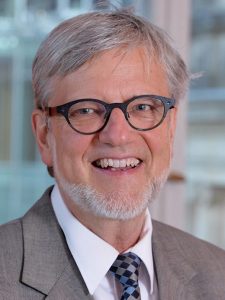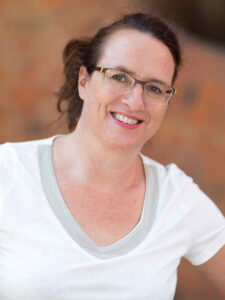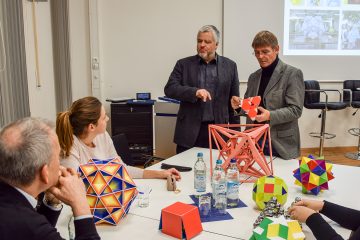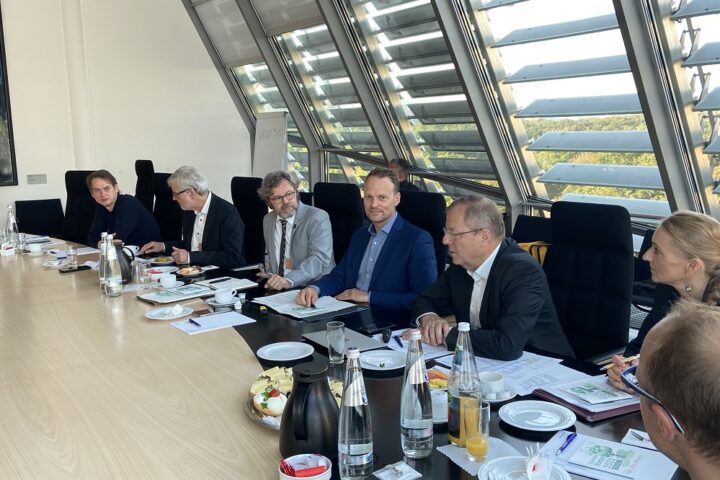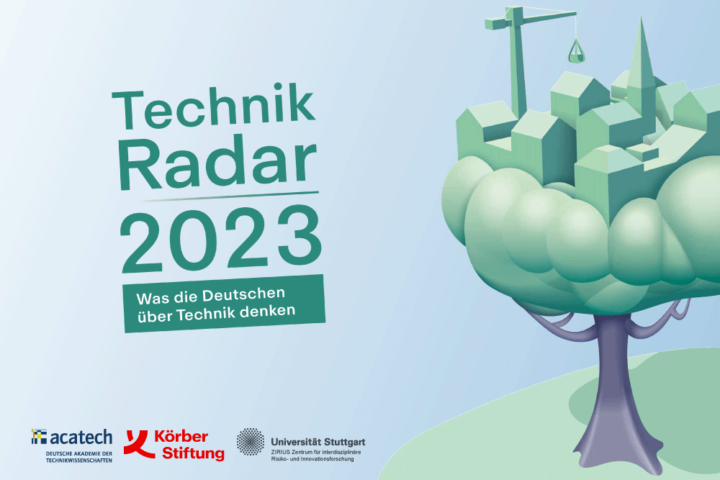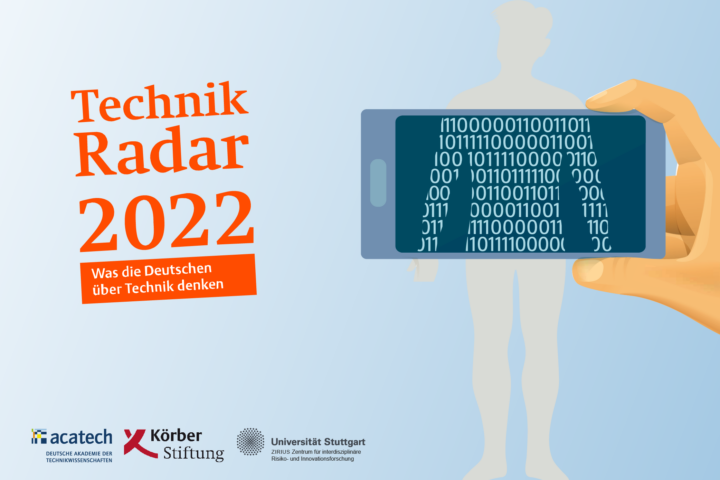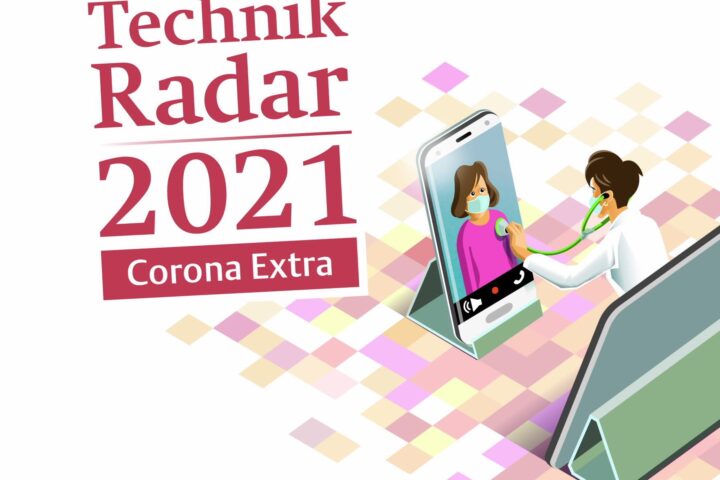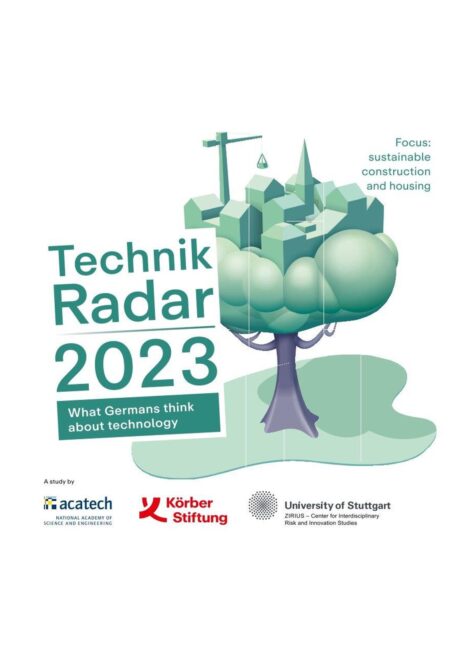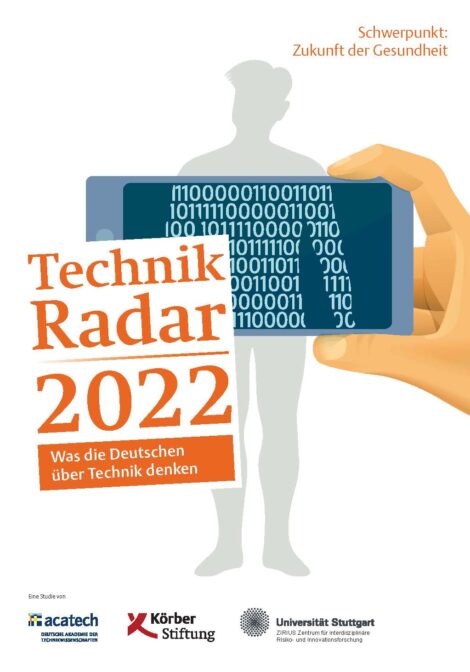TechnikRadar
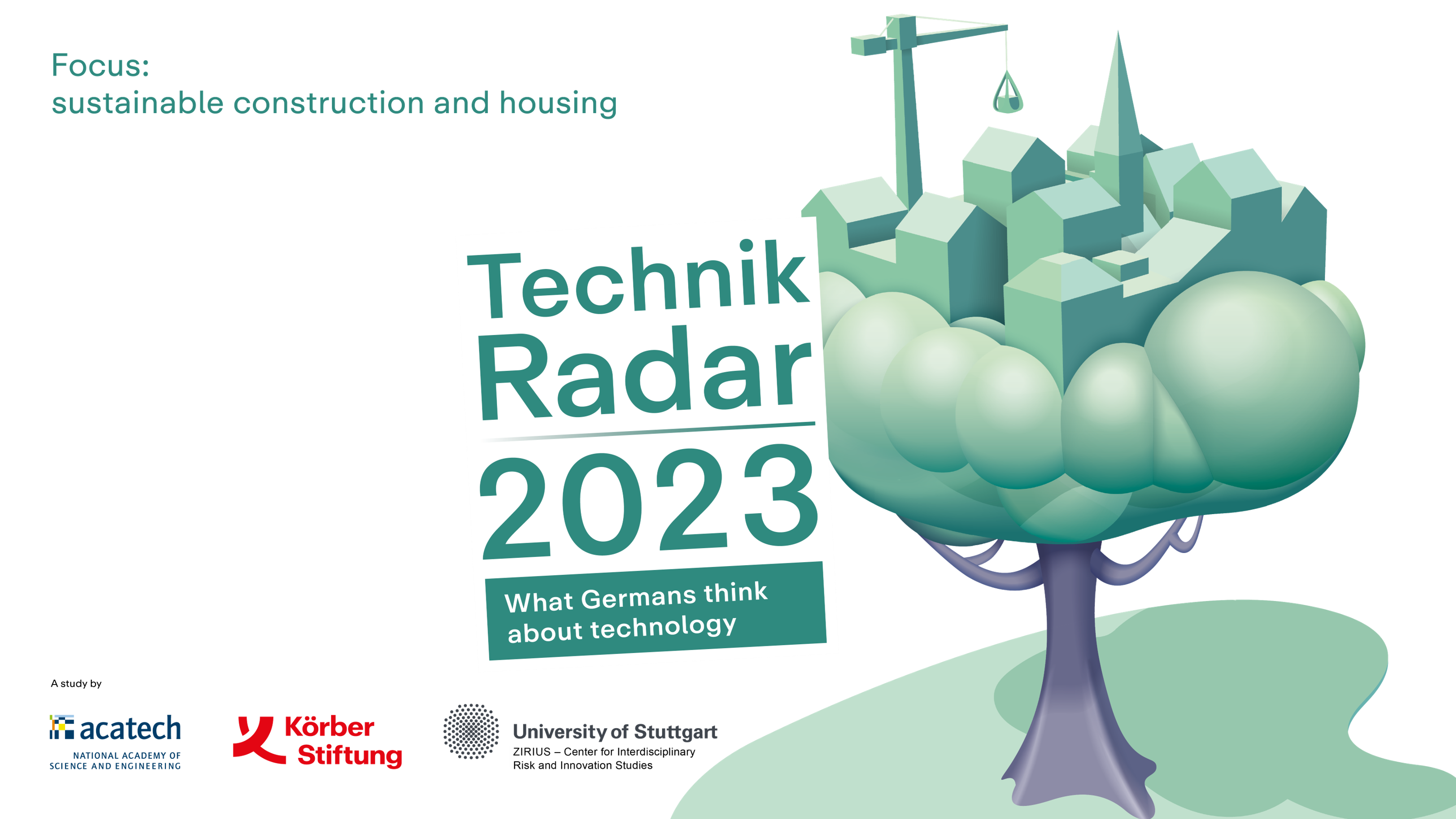
© Körber-Stiftung/acatech
What is the TechnikRadar?
The TechnikRadar (Technology Radar) is a regular survey that asks the German public about their views, wishes, hopes, fears and needs in connection with new technologies and their implications. It serves as a long-range early-warning system, flagging technological wrong turns in good time and pinpointing special areas where communication is needed. At the same time, the TechnikRadar aims to support processes of innovation so that products and technologies coincide with people’s expectations. The results provide a solid basis for debate about the role of, regulatory requirements for and possibilities for shaping technical innovations.
TechnikRadar 2023 – Sustainable construction and housing
TechnikRadar 2023, which focused on sustainable construction and housing, was published on 20 June 2023. What do Germans think about technology? What are their views on sustainable construction and housing?
Highlights of the TechnikRadar 2023
Most pressing issues for the future
Since the first survey, protecting jobs has consistently been ranked as the number one issue for the future – across all generations. An uncertain supply situation and rapidly rising energy prices notwithstanding, climate protection remains important, but has been pushed out of second place by issues such as national security and data protection. Limiting rises in housing prices, on the other hand, is in last place among the issues surveyed, being of above-average importance solely for women and low earners.
The importance of limiting global warming has remained the same in absolute terms compared to the last survey, but has slipped to fourth place for the middle (35 – 64) and oldest respondent groups (65+) behind preserving national security and data protection as the second and third most important issues for the future. Only for the younger group (16 – 34) does climate protection come second to protecting jobs, followed by data protection in third place and national security in fourth.
Assessment of technology trends
The increasing use of renewable energy is rated as the most beneficial measure. Only the benefits of building refurbishment are rated comparably positively. In contrast, respondents perceive robotics as carrying the greatest risk (in this case in relation to the construction and care sectors). Only care robots are perceived to involve a distinct net risk (the difference between the benefit and risk values, in this case – 2.2), while for construction robots the benefits only slightly outweigh the risks (+ 0.3).
While the assessment of benefits is relatively uniformly distributed among the population, there are major differences in the perception of risks. In particular, women and those without a university degree generally give all measures a somewhat higher risk rating than do men and graduates; older persons also generally rate them as riskier.
Urbanisation and living in the countryside
The affordability and, now, also the energy efficiency of housing are the most important factors for respondents, whether renter or buyer. The goals of urban infill development and renewed densification of cities do not fit well with Germans’ preferences for living in a green and peaceful environment. TechnikRadar 2023 confirms this, with “peace and quiet”, “proximity to nature” and “balcony” being of great importance to most people. Despite the steady move to large cities, the associated characteristics of “proximity to the city centre” and “public spaces for meeting up” rank lowest, irrespective of gender and income.
Rent increases due to renovation
There is an ongoing debate among policy makers and the public as to how much tenants should contribute to the renovation costs. This is why TechnikRadar 2023 investigated the extent to which tenants are willing to contribute to renovation costs if their own energy consumption falls as a result.
Half of the surveyed tenants would be willing to accept a rent increase in the amount of the energy costs saved following renovation. However, only 12.2 % of respondents found an increase in rent greater than the saved energy costs acceptable, while around one third (37.7 %) are only willing to contribute less to the costs of renovation than the saved energy costs.
Robots to combat shortages of skilled workers
On average, the consequences of using robots in construction were considered more likely to be positive than negative. In particular, respondents see benefits in reduced costs and shorter construction times, as well as a possible solution to the shortage of skilled workers. Nevertheless, concerns about job losses remain in the foreground, while an increase in workplace accidents is considered rather unlikely.
Higher income groups expect more highly automated construction processes to help solve housing shortages, primarily by reducing construction times and costs. Lower earners, in contrast, fear job losses from the use of construction robots.
More convenient living in the smart city
So-called city dashboards are an important element of smart cities. These are intended to provide citizens, businesses and local authorities with a continuous insight into information on urban development, energy demand or the use of transportation services. More than half of respondents are very willing to share their data on energy consumption, building (e. g. year of construction, state of renovation, level of equipment) and / or mobility in anonymised form for this purpose. The picture was different in TechnikRadar 2022 in relation to health data, which are perceived to be more sensitive. Contrary to the trends in other age groups, women in the 16 to 34 year old group are more willing than men to share their data. And this is despite their interest in using it being almost ten percentage points lower than men’s.
As might be expected, age also affects interest in use in this area. Interest declines sharply with increasing age: while 61 % of 16 to 34 year olds would make use of such services, the figure is only 34 % for the 65s and over.
More details on the controversial results can be found here:
Previous years’ TechnikRadar
The TechnikRadar 2022 (in German) revolved around how Germans view the possibilities that the digital transformation holds for the health system. Because research has extensive access to medical data, some people hope that the digital transformation will bring new therapies as well as much better healthcare, while others fear that the increasing volume of data will result in a goldfish bowl effect in healthcare. Here (in German) is a summary of the results of the TechnikRadar 2022. The data of the TechnikRadar 2022 survey is provided for download at the database GESIS – Leibniz Institute for the Social Sciences.
The TechnikRadar 2021 (in German) asked stakeholders in healthcare for their views on the digital transformation of the health system. A special edition of the survey, the TechnikRadar 2021 Corona Extra (in German) explored how German attitudes to technology have changed as a result of people’s experiences of the coronavirus pandemic.
The TechnikRadar 2020 (in German) centred on people’s general attitude to technology as well as the views of Germans on the goals and possible impact of the bioeconomy. The data on which the TechnikRadar 2020 was based are available to download here.
The results of the TechnikRadar 2018 (in German), which focused on digitalisation, were compared with attitudes of people in other European countries in the TechnikRadar 2019 (in German). The data on which both the 2018 and 2019 surveys were based are also available to download from the database GESIS – Leibniz Institute for the Social Sciences here.
TechnikRadar press packs
TechnikRadar 2023 (in German)
TechnikRadar 2022 (in German)
TechnikRadar 2021 Corona Extra (in German)
TechnikRadar 2021 (in German)
TechnikRadar 2020 (in German)
TechnikRadar 2019 (in German)
TechnikRadar 2018 (in German)
Project group members
- Univ.-Prof. Dr. Daniel Barben
Universität Klagenfurt - Prof. Martin W Bauer
London School of Economics and Political Science - Nicole Burkhardt
Bundesministerium für Bildung und Forschung - Prof. Dr. Manuel Frondel
RWI-Leibniz-Institut für Wirtschaftsforschung - Prof. Dr. Martina Heßler
TU Darmstadt - Prof. Dr. Eva-Maria Jakobs
RWTH Aachen University - Prof. Dr. Cordula Kropp
Universität Stuttgart - Prof. Dr. Sabine Maasen
Universität Hamburg - Prof. Dr. Drs. h.c. Ortwin Renn
RIFS - Forschungsinstitut für Nachhaltigkeit - Prof. Dr. Mike Schäfer
Universität Zürich
Advisory committee members
- Nicole Burkhardt
Bundesministerium für Bildung und Forschung - Jonathan Diesselhorst
Industriegewerkschaft Bauen-Agrar-Umwelt - Dr. Benedikt Fecher
Wissenschaft im Dialog gGmbH - Dr. Saskia Freye
Hans-Böckler-Stiftung - Caroline Gebauer
BUND - Bund für Umwelt und Naturschutz Deutschland e.V. - Dr. Markus Ksoll
Deutsche Bahn AG - Dr. Karen Köhler
Bayer AG - Dr. Sicco Lehmann-Brauns
Siemens AG - Dr. Steffi Ober
NABU – Naturschutzbund Deutschland e.V. - PD Dr.-Ing. Simone Raatz
Helmholtz Institut Freiberg für Ressourcentechnologie - Dr. Ulrich Romer
Bundesminsterium für Wirtschaft und Klimaschutz (BMWK) - Dr. Stephan Schleissing
Institut Technik-Theologie-Naturwissenschaften - Volker Stollorz
Science Media Center Germany gGmbH - Dr. Theresa Züger
Alexander von Humboldt Institut für Internet und Gesellschaft


